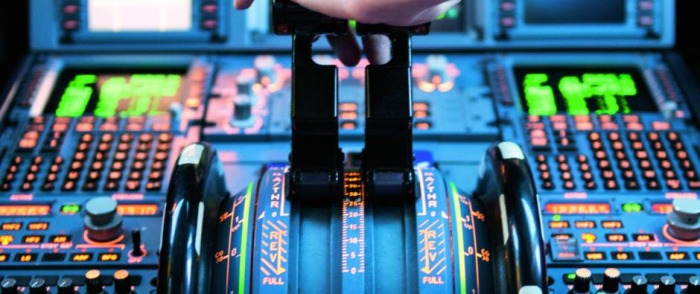
Airline Pilot
Learn to fly and get all the technical and operational knowledge about airplanes. Unique airline pilot training in Flanders at Ostend international airport.
Have you been practicing the phrase “This is your captain speaking” since you were a kid? Your passion for aviation is about to hit a new level. This programme combines a pilot training with a bachelor’s degree: a unique mix that will have you aim for the sky in your career – literally.
Flying is a passion. For you, for us and for BAFA, our training partner. Together we put everything to work to get you a job in the cockpit (your flying desk at 12 kilometres above the ground) or as an unmanned aircraft pilot (at sea level). From all over Europe, students fly in to become an aviation professional.
Attention: to be admitted to this major, you need to meet certain medical requirements (valid medical certificate).
The airline pilot training follows the newest EASA FCL (Easy Access Rules for Flight Crew Licencing) norms. To do so, VIVES works together with the Flemish ATO (Approved Training Organisation) and BAFA (Ben Air Flight Academy), who shares the Flemish Aviation Training Centre VLOC with us. The EASA-FLC (1) is the attainment level for this major.
After a shared track of three semesters with the major Aeronautical Engineering, you follow the specialised theoretical part of a pilot training during the remaining three semesters. In this stage, you’ll be collecting your first flying hours, solo and with an instructor.
To become the official holder of a permit to fly, you must start the adjoining practical training (approximately 165 flight hours) within 21 months after graduating this bachelor’s degree. This is possible in Flanders or Florida (USA). Take into account that this additional training comes with an extra tuition fee, such as theory, a 36-hour flight training, practical material and fees for ATO. Prices may vary depending on variable costs such as fuel.
In order to be admitted to the major Airline Pilot, you need to have a valid medical certificate, in accordance with the Ministerial Decree of 21 June 2002 on the conditions regarding physical and mental fitness of the members of the flight crew of civil aircraft.
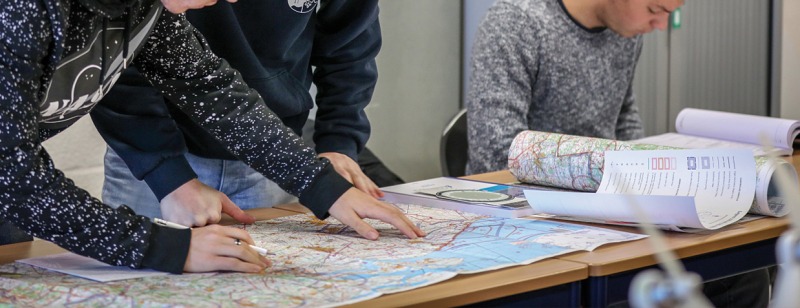
Study material
Study material includes books, syllabuses and digital tools you need during your degree.
Study material
Check the syllabus for this course:
- Propeller Technology (Dutch)
Courses and practice
Curious which courses and practical components are part of your programme? Find an overview here.
Courses and practice
- Aerodynamics
- Computer Aided Design in Aviation
- Emerging Technologies
- Lab Aviation Technology
- Technical Mathematics
- Aircraft Electricity
- Aircraft Mechanics
- Aircraft Structures
- Aviation Physics
- Aviation Electronics
- Air Transport Economics
- ICT
- International Mobility
- Aircraft Materials
- Aircraft Systems
- Reciprocating Piston Aircraft Engines
- Remotely Piloted Aircraft Systems (RPAS) Unmanned Aviation
- Analog and Digital Techniques
- Quality Management and Safety
- Business Management
- Aviation Legislation
- Visual Flight Rules (VFR) and Instrument Flight Rules (IFR) Communication
- VFR Performance and Planning
- Flight Training and Operations
- Physiology and Psychology
- Weight and Balance
- Performance Calculation
- Radio Navigation
- Flight Training
- Aviation Procedures
- Meteorology
- Applied Aerodynamics and Performance
- Communication
- Navigation
- Avionics Systems
Timetable
Down below you can find an example of a possible timetable. On average, you will have twenty class hours a week.
You can also access the timetable of our current students in the first, second, and third phases via the link in the top left.
Timetable
Shaded areas = free moments
| Mon | Tue | Wed | Thu | Fri | Sat | |
|---|---|---|---|---|---|---|
|
8.30 a.m.
|
Lab Aircraft Electricity
|
Lab Aircraft Mechanics
|
Exercises Technical mathematics
|
|||
|
9.30 a.m.
|
Computer Aided Design in Aviation
|
Exercises Aircraft Mechanics
|
Lab Aircraft Electricity
|
Lab Aircraft Mechanics
|
Exercises Technical mathematics
|
|
|
10.45 a.m.
|
Computer Aided Design in Aviation
|
Aircraft Mechanics
|
Lab Aircraft Electricity
|
Lab Aircraft Mechanics
|
Technical mathematics
|
|
|
11.45 a.m.
|
Aviation Physics
|
Aircraft Mechanics
|
Lab Aircraft Electricity
|
Technical mathematics
|
||
|
1 p.m.
|
Pause | |||||
|
2 p.m.
|
Air Transport Economics
|
Aircraft Elecricity
|
Lab Aviation Technology
|
Lab Aircraft Mechanics
|
||
|
3 p.m.
|
Air Transport Economics
|
Aircraft Elecricity
|
Lab Aviation Technology
|
Lab Aircraft Mechanics
|
||
|
4.15 p.m.
|
Aviation Physics
|
Aircraft Elecricity
|
Lab Aviation Technology
|
Lab Aircraft Mechanics
|
||
Study material
Check the syllabus for this course:
- Propeller Technology (Dutch)
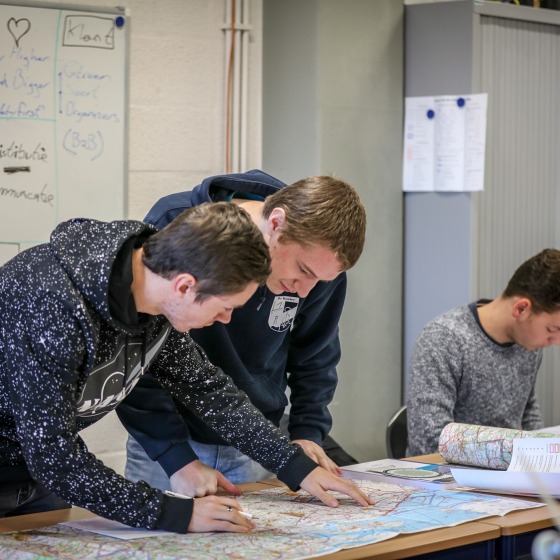
How long does this programme take?
A professional bachelor’s degree in Aviation is a practical programme that you can complete in a cycle of six semesters or three academic years. The programme consists of 180 credits. As a student, you will put together an individual study programme (ISP) to earn all these credits through our predetermined courses.
Most students, however, enter the regular programme, which consists of 60 credits every year. If you fail certain course units, you will adjust your individual study programme in consultation with the study counsellor.
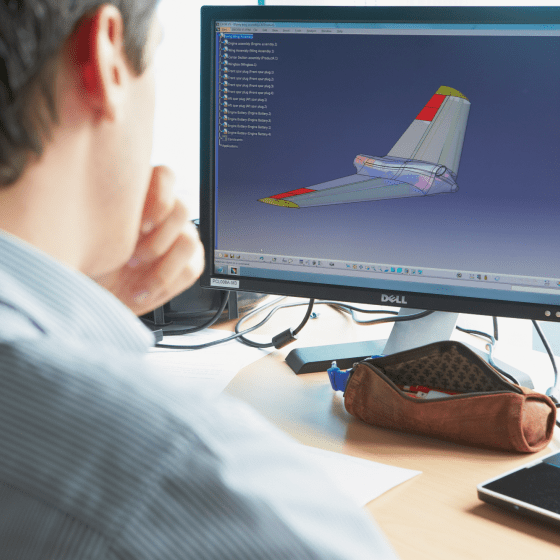
How does VIVES organise this programme?
Lessons in pilot uniform. Flying instructors. Syllabuses on a tablet. Airplanes. Definitely not your average school activity.
The bachelor’s degree Aviation actively applies the principles of 'blended learning' at VLOC. Aviation is a passion, and we convey that passion in our programmes. The programme is based on the ACT concept: 'Active learning and competence-focused training', which stimulates active student participation during the course and interactive use of aviation elements.
To do so, VIVES has a very extensive technical infrastructure, unique in the Benelux. There are several simulators, engines, systems and even airplanes available. Online training is also included. This way, there is a better mix of theory and practice overall.
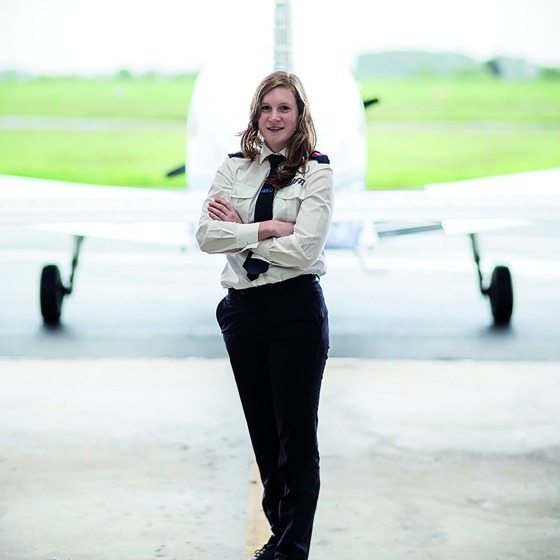
What will you learn?
For the Airline Pilot programme, procedures and safety during flying are the most important. What will we teach you?
- technical and operational knowledge of aircraft
- professional competences
Year 1
- mix of 50% theory and 50% practice (labs and practice sessions)
- labs and practice sessions closely related to the theory
- immediate practice and application of theoretical knowledge
Year 2
- more independent work in smaller groups
- assessments for airline pilot (including medical assessment)
- specialisation choice after semester 3: Airline Pilot
- theoretical ATPL training
Year 3
- theoretical ATPL training
- flight training (from instructor to solo)
- exams at the Federal Public Service Mobility and Transport
- company visits & acquaintance with the logistics of the aviation sector
Year 4
(after graduating at VIVES, at BAFA in Flanders or in Florida)
- flight training
- simulator training
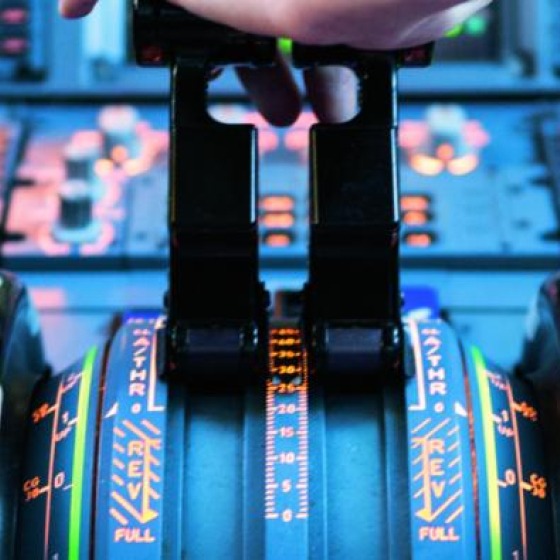
Will I go on an internship during this course?
Safe flying, that's a project for your entire life, including your internship. You will fly at least 36 hours with VIVES. It can be more – we even prefer so.
A graduation project is also included, in which you’ll set up a complete flight preparation that you will present at the bachelor's project days in June of your final year. This is done in the presence of the responsible parties of Belgian airlines and ATOs (Approved Training Organisations).
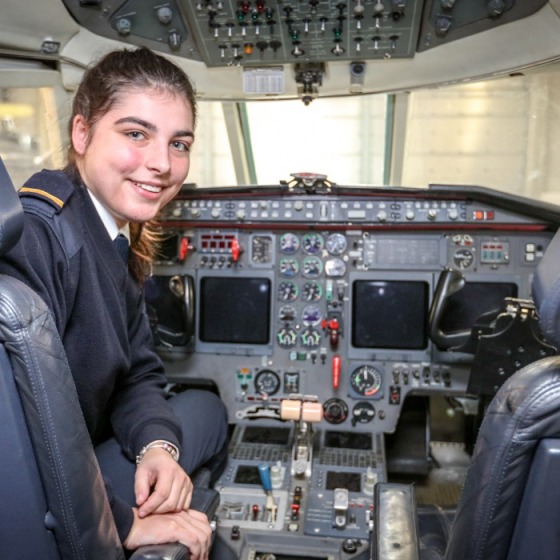
How much does this programme cost?
A programme to become an airline pilot at VIVES & BAFA definitely provides added value compared to a flight training programme that starts directly after secondary education. Belgian airlines are increasingly demanding a minimum level of a bachelor's degree. Therefore, campus recruitment also takes place at VIVES University of Applied Sciences.
An airline pilot programme is not cheap, but with careful financial planning and a good dose of effort, it is not the huge hurdle that many people think it is.
The total cost of the pilot education (three years at VIVES and one year at BAFA) is divided into three parts:
- Study costs as a VIVES student (registration fees, books, etc.)
- Specific costs during the VIVES education (semesters 4, 5 and 6) for airline pilots. This includes theory and flight hours up to at least Private Pilot Licence (PPL) solo level.
- Final costs after the bachelor's degree for the remaining flight hours at BAFA.
Prices change depending on the index, fuel cost, and other parameters. Contact the head of this programme to provide you with the current status and more financial background.
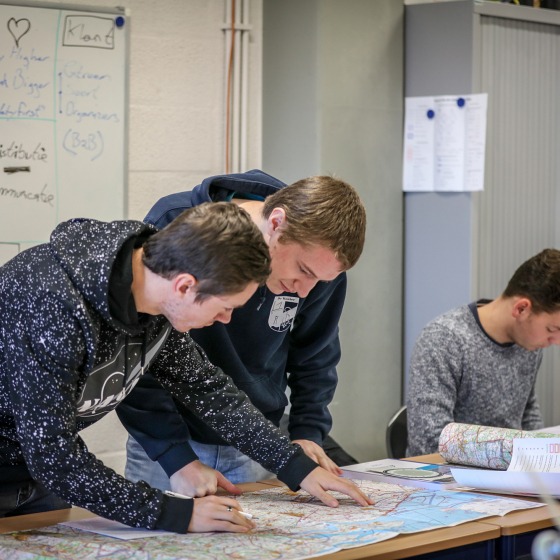
How can I obtain the medical certificate for this programme?
To be admitted to the major Airline Pilot, students must have a valid JAR-FCL 3 medical certificate (Ministerial Decree of 21 June 2002 on the conditions regarding physical and mental fitness of the members of the flight crew of civil aircraft). Medex, the Expertise Centre for Aviation Medicine, serves as the central medical centre in Belgium for pilot fitness certificates in civil aviation.
The recognition of a flight licence and its legal validity is linked to the recognition of very strict medical criteria, as described in European EASA legislation and controlled by Medex. Before students are admitted to the major Airline Pilot, they must provide a copy of their medical certificate to the student administration office. The medical examination for obtaining (and renewing) a CPL-ATPL-IR licence must be requested from:
Expertise Center for Aviation Medicine
Simon Bolivarlaan, 30 (box 3), 1000 Brussels
Tel: +32 2 524 97 97, Email: medex@health.fgov.be
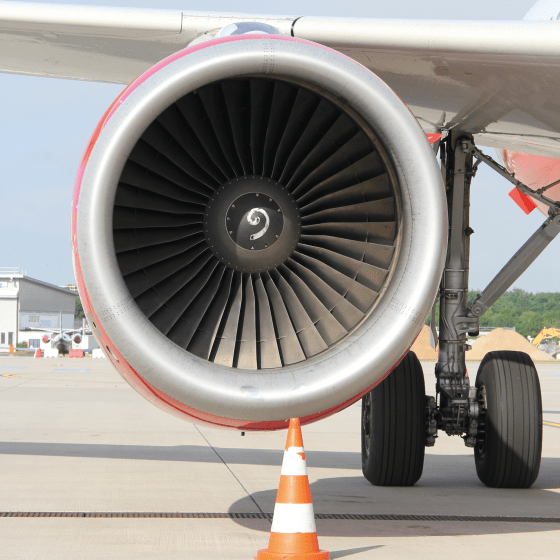
Does this program have its own student club?
Our students have their own student club Euroavia. Cool activities such as company visits, design competitions, or fly-ins are on the agenda every year.
Studying abroad
Do you love an international challenge? We consider it important to give you the opportunity to gain international experience and broaden your perspective on professional possibilities. If you want to become an engaged global citizen, internationalisation is an essential part of your programme.
VIVES Technology offers all opportunities to give your education an international boost. We help you arrange your experience abroad from start to finish, to make it the best time of your life.

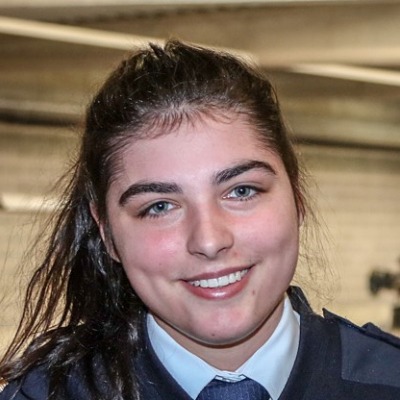
"My professional dream is to become a long-haul pilot. Of course, I need to start with short flights to get there. I’m slowly gaining experience: I have already flown solo once and I have flown all the way to Midden-Zeeland in the Netherlands with an instructor. I have also completed night flights. The campus in Ostend is perfectly equipped for this training: there are simulators, training aircraft, and we have an airport right on our doorstep."
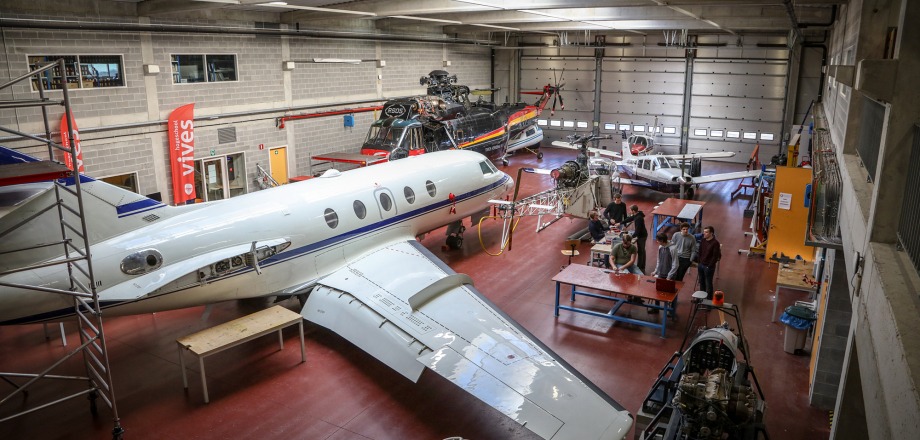
Studying
- Aeronautical Engineering
- Industrial Engineering - Aviation
- Master of Industrial Sciences and Technology
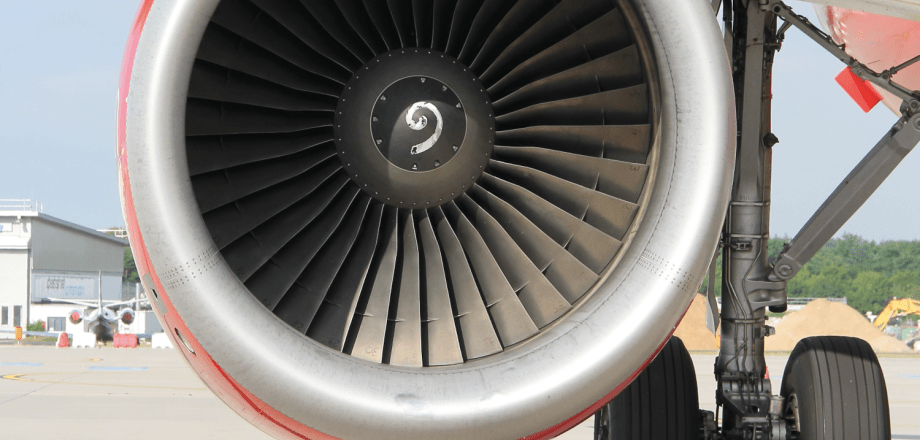
Job opportunities
- Airline Pilot
- Business Jet Pilot
- Flight Planner
- Drone Operator
- Flight Simulation Instructor
- Aviation Safety Inspector
- Ground Instructor Aircraft Systems
This study in short
Field of study
Study type
- Degree Programme
- Bachelor
Way of study
- Dagonderwijs
Studyroute
- Afstudeerrichting
Amount of credits
- 180
Where can I study this?
Startmomenten
- Autumn
- Spring
- verschillende instapmomenten
Language of education
- English
Contacts for this study
Quality
VIVES guarantees the quality of this degree. This is based on the VIVES reference framework and education action plan.
